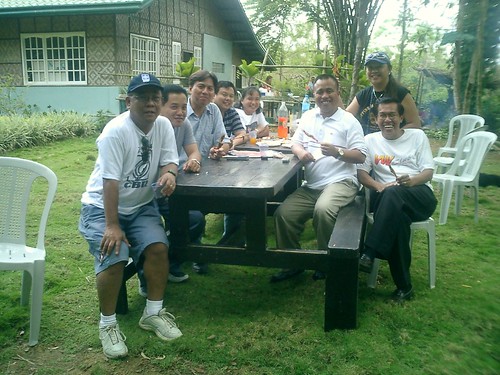Sounding Board : Let's get it over with
Fr. Joaquin G. Bernas, S.J.
Inquirer News Service
THE JOKE has been going around that Speaker Jose de Venecia landed in St. Luke's Hospital with bleeding hands from too much vigorous clapping during the last Sona of President Macapagal-Arroyo. He and former President Fidel Ramos are the principal cheer leaders in Ms Arroyo's campaign for constitutional revision. And they want it done through Congress acting as a constituent assembly.
If they really want to, they can start it today. The constituent assembly enthusiasts will find the 1987 Constitution helpful for getting started. But completing the work will be something else.
Under the 1935 Constitution, before Congress could act as a constituent assembly, the two houses had to agree first to meet in joint session. The text of the 1935 Constitution read thus: "The Congress in joint session assembled, by a vote of three-fourths of all the Members of the Senate and of the House of Representatives voting separately may propose amendments to this Constitution . . ." Clearly, under the 1935 Constitution, before Congress could consider constitutional amendments, the two houses had to approve first a resolution convening Congress to a joint session for the purpose.
The language of the 1987 Constitution is different. It simply says: "Any amendment to, or revision of, this Constitution may be proposed by: (1) the Congress, upon a vote of three-fourths of all its Members . . ." There is nothing there about having to come together in joint session. My reading of the present text is that, even without a resolution converting Congress into a constituent assembly, Congress, as is, can already consider amendments to the Constitution. The present text, without more, already makes Congress a constituent assembly.
From this it follows that, if any member of the House or of the Senate wishes to propose changes in the Constitution, all he or she has to do is formulate them, submit them to the House where he or she belongs, and, if after being reported out for debate they are approved by a vote of three-fourths of all the members, it is next passed on to the other house for action. If both houses approve the same changes, then they are ripe for ratification in a plebiscite.
The preliminary step of convening a constituent assembly is no longer necessary under the present dispensation (although it may still be used if both houses agree to a joint session). The present text simply says that Congress, a bicameral body, may propose amendments by a vote of three-fourths of all its members. The two houses can already do this as they are and where they are. The two houses as they are and where they are already have constituent powers given to them by the Constitution.
If Speaker De Venecia or any other member of the House is passionately set on setting in motion the process of amending or revising the present Constitution, let him or her formulate the changes desired and submit them for action by the House of Representatives. This way, what President Arroyo calls "the great debate" can begin in earnest and not just in press releases.
I therefore urge the advocates of constitutional change to let the world know what form of parliamentarism and federalism they want. They have the right to do so and no one should begrudge them that right. Which does not mean that they will get what they want.
If they will do this, we will finally see if, indeed, they can get the support of three-fourths of all the members of the House. That should mean something like 177 votes in favor. If they do not get that support from the House, we can breathe a sigh of relief, and Congress can go on to more urgent business. And if they do get the needed votes, we will soon enough know how solid the Senate opposition really is. To kill any proposed amendment, all that is needed is for seven senators to vote against it. Present indications seem to be that unless there is a miraculous conversion in the thinking of senators, the lower House will not have its way.
We might recall that it was also during the month of August in 1997 that there was much agitation for constitutional revision. Word going around then was that it was being orchestrated by incumbent President Fidel Ramos. The hot objective then was the removal of the term limits on national elective officials. Now the flavors of the month are parliamentarism and federalism. We should soon enough see if these will sell.







No comments:
Post a Comment